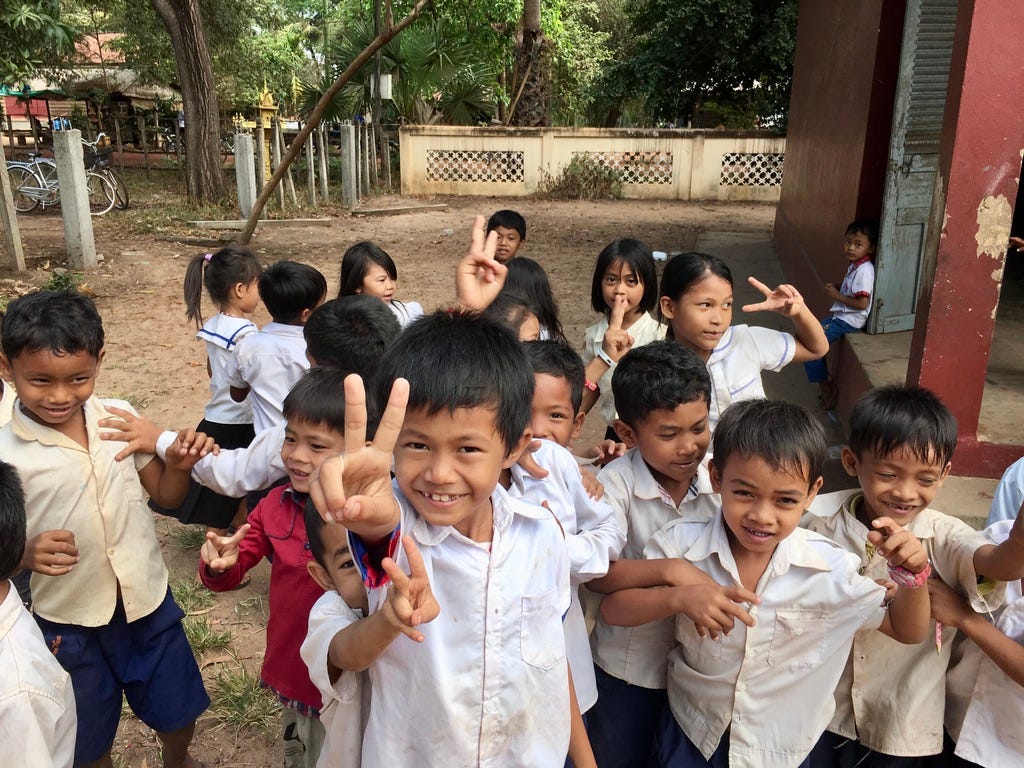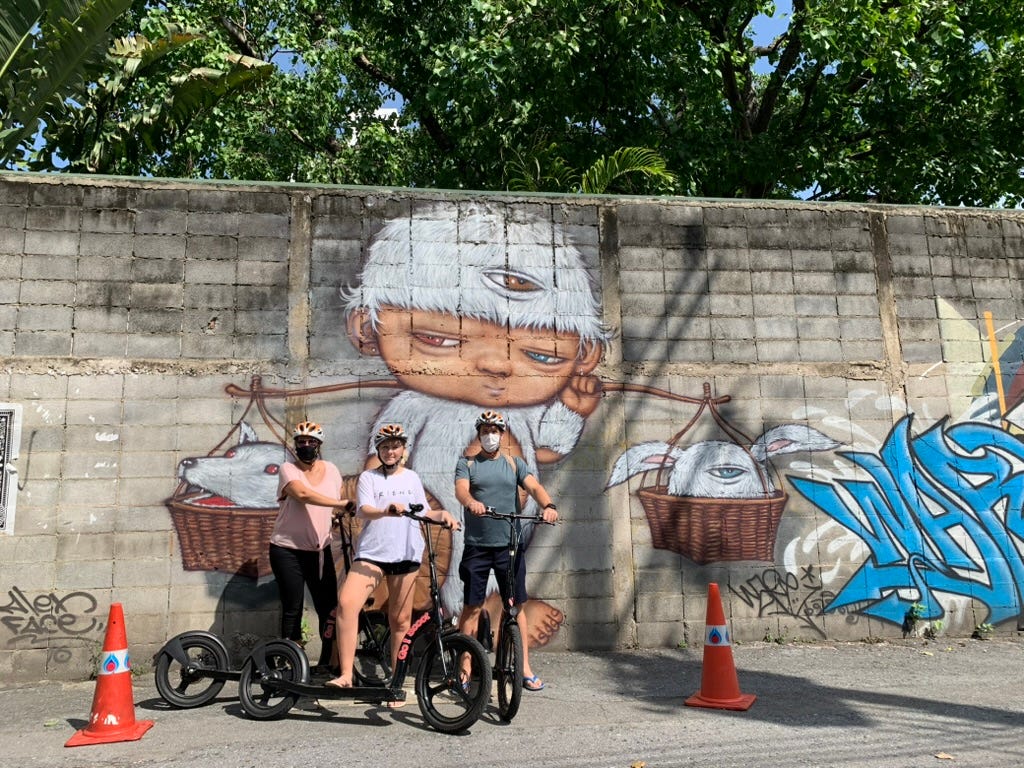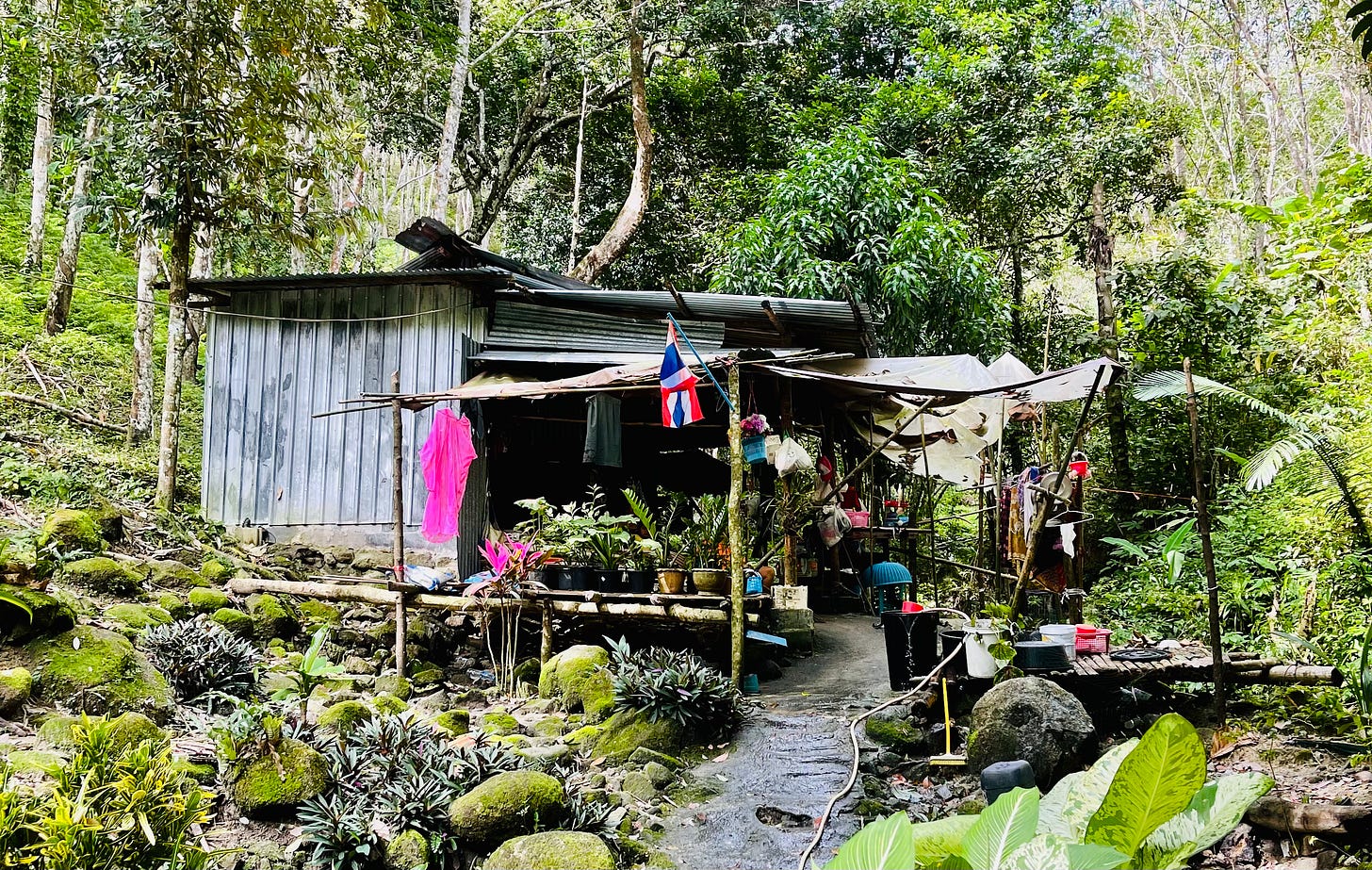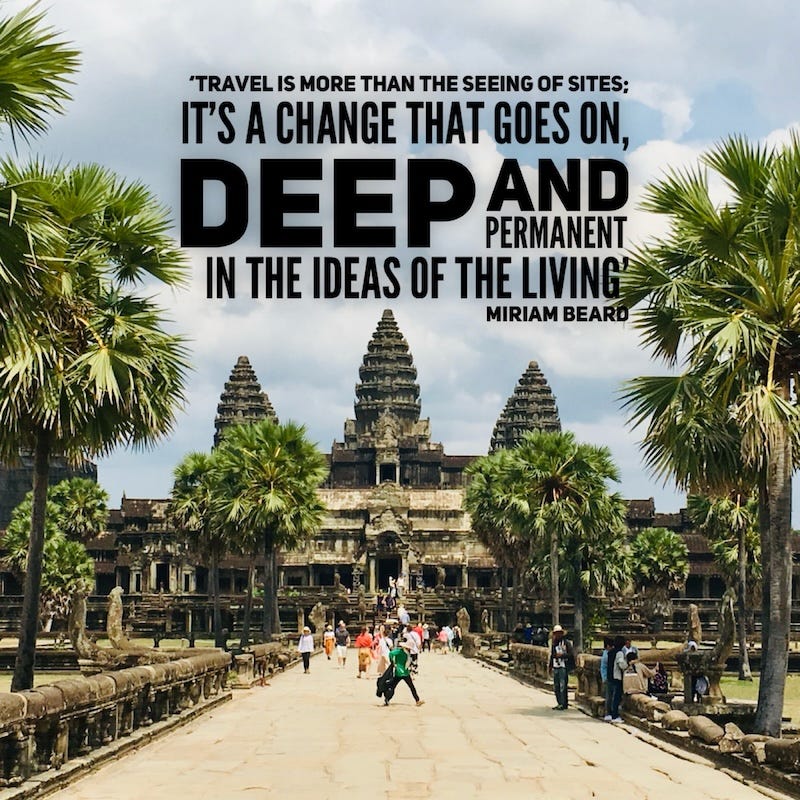6 Tips to Truly ‘See’ a Country: A Guide to Deep Travel
Experience the soul of a destination that most travellers never discover
Out of the 40+ countries I’ve visited in the last 14 years, Cambodia stands out as one etched in my memory.
Perhaps it’s because our guide didn’t know how old he was or the date he was born. He knew he had a sister somewhere, but both parents had been killed and all documentation destroyed by the Khmer Rouge.
Perhaps it was because another young guide, so hopeful for the future with a new younger forward thinking government, was dreaming of starting his own tour company as more tourists flocked to the country.
Already fluent in English, he was learning French and Chinese also. What a shame the opposing player disappeared in mysterious circumstances and the country continues to be stifled by the incumbent government.
Perhaps it was because we took a trip to a village and school, and experienced how a local community lived, worked and learned.
Perhaps it was all of the above and more.
So often I’ve found that when travelling, particularly when only spending a day or two in any one place, that I rarely get the full measure of a country.
Armed with a list of the top spots to see, and a tight schedule, it can sometimes feel like a race to get in as much as possible in a short space of time.
But it doesn’t take too much effort to turn even just a few short days into an immersive experience which imprints into your subconscious for years to come.
Here’s some tips on how to truly ‘see’ a country, even if you’re only visiting for a couple of days;
1. Read About Your Destination Before You Get There
I wish I’d learned more about Cambodia before we arrived. It was only after the fact did I read the horrifying (and highly recommended) Pol Pot by Philip Short, which gave me far more insight into the country and its recent history.
I’m not saying you need to consume a novel about every country you visit, but the more you learn about it before you get there, the more you can understand its economy, culture, traditions and customs.
By all means get the rundown of the ‘Top 10 things to do in X’, but also read through the associated Wikipedia page and look for some more historical information, so you get a sense of the past events that have shaped the destination.
Then, if and when a place truly captures your heart, you can read even more after the fact and learn more about the country and its people.
For truly immersive travel, we’re not just visitors passing through; we’re travellers seeking to understand, appreciate, and connect with a world that’s different from our own.
2. Hire a Local Guide
The fastest way to learn more about the place you’re visiting and perhaps find places more off the beaten path is to hire a local guide.
Having lived in Thailand for over 10 years and often frequenting Bangkok, I thought I knew it pretty well. That was until we booked a stand up scooter tour and a local guide took us to all the nooks and crannies only a native would know!
When you hire someone local to show you the sights, you're not just getting a tour guide; you're unlocking a goldmine of local knowledge, stories, and experiences that can transform your trip from ordinary to extraordinary.
Local guides bring a depth of understanding and insight that can't be found in guidebooks or online articles. They immerse you in experiences that allow you to see the destination through the eyes of someone who lives there, providing a richer, more authentic understanding of the place.
If they’re great at what they do, they’ll also captivate you with legends and stories ensuring you remember the place and the experience for years to come.
My trip to Varanasi in India, wouldn’t have been as magical if it hadn’t been for our guide telling us all the legends, stories and beliefs around the river Ganges, the morning rituals, the cremations etc.
Hiring a local guide is also an excellent way to support the local economy.
3. Eat Like a Local
I realise that this is a total No No for some people, but exploring the local cuisine is more than just satisfying your taste buds; it's a foray into the culture, history, and essence of the place.
When my sister & I went to India, we decided to go full vegetarian in an attempt to avoid Delhi-Belly.
Little did we know that most meals in India are vegetarian anyway and we had an amazing culinary experience. I haven’t tasted food like the food in India, anywhere in the world.
Forget your local Indian restaurant which is overloaded with spices and sugar. True Indian food is rarely so hot it blows your head off, and is instead like an explosion of tastes in your mouth.
I wouldn’t have known that if I refused to try it.
But I get that trying unfamiliar food can sometimes be intimidating. And there have been places which have been a flat Nope for me. Such as duck intestines in China or pig intestines in Japan. In fact any kind of intestine is a No from me! 😂
However, when travelling to a country, it’s a good idea to approach food with an open mind and sense of curiosity. Don’t just head to the nearest Maccas. Give some of the local dishes a try, who knows you might find a new favourite.
Also remember, food has a way of bringing people together. Sharing a meal is a universal form of bonding, and engaging in this ritual in a new place can lead to meaningful connections and interactions.
Many times I’ve been invited to a family dinner in Thailand, and have found myself sitting on the floor, digging rice out of a bowl with my fingers.
The key is to just be open to trying. If you don't like it, don’t eat it, but if you’re looking for true immersion, close your eyes and go!
4. Embrace the Unknown
When I lived in Thailand I regularly hiked with a good (and very athletic) friend of mine Michelle. We are hiking soul mates as she can talk from the beginning of the hike to the end, no matter the elevation, while I puff and pant my way up the hills just listening to her fabulous stories!
Aside from that wonderful ying and yang of fitness levels which somehow works, we love hiking together, because we’ll reach a pathway which has two routes and not knowing where we are, we’ll ‘eeny meeny miny moe’ our way ahead.
Somehow we’ll always end up where we started, but the route to get there is invariably a walk through the unknown. And because of this we’ve discovered old abandoned houses built deep into the woods, Thai families living at the top of waterfalls, old temples and shrines and some of the most glorious vistas!
I’ve always found that one of the most exhilarating aspects of travel is the element of the unknown. Allowing yourself to venture beyond the familiar, turning every moment into an opportunity for adventure and learning.
Even just getting lost in the narrow, winding streets of a historic city, or meandering through a metropolis with no purpose or direction. You never know what you might find! And it’s these experiences, rich in spontaneity and surprise, that often lead to the most interesting travel memories.
Navigating the unknown also encourages flexibility and resilience. It teaches you to adapt to changing or challenging situations, whether it's dealing with a foreign metro system (experienced in China), getting on the wrong train (as my sister & I did in Germany) or even changing your plans altogether due to circumstances beyond your control (bombings in Sri Lanka/ protests in Hong Kong/storms in Australia - the list of experiences we’ve had is endless)
Adaptability is not just a valuable travel skill; it’s a life skill.
But embracing the unknown isn't just about places. It's sitting down to a meal with ingredients you can't identify, like the time we went to ‘Noir. Dining in the Dark’ in Vietnam.
It’s joining in a local celebration, like the time we joined the Vegetarian Parade with the locals in Thailand. It’s engaging in a conversation with someone from a completely different walk of life, as I did with my Cambodian tour guide.
These moments of connection and cultural immersion are the essence of meaningful travel.
By embracing the unknown, you open yourself to the true spirit of exploration, letting go of preconceived notions and embracing each experience as it comes.
This to me is what makes immersive travel so exciting!
5. Learn a Few Local Phrases and Embrace Linguistic Mishaps
As we arrived at Singapore airport, my sister gleefully said to the immigration officer ‘how do you say Hello here?’
‘Hello’ he said dryly.
You had to be there, but as someone who’s travelled to Singapore on more than a few occasions I found the exchange highly amusing.
Jokes aside though, one of the most effective bridges to cultural connection is language. And learning just a handful of phrases in the local tongue can profoundly impact your travel experience.
I’ve always found that even just being able to say Hello, thank you, please, and where’s the toilet, goes a long way!
As a Brit, the arrogance of Westerners in other people’s countries sometimes infuriates me, as if we expect the rest of the world to speak English. But if you can learn even the basics it signals respect for the culture and a willingness to engage on a deeper level.
It’s heartwarming how a simple 'Xin chào’ in Vietnam or ‘Selamat’ in Malaysia can bring a smile and a warmer response.
But language learning isn’t without its challenges and, often, humorous mishaps. Mispronunciations and mix-ups are an inevitable part of the process, so instead of feeling embarrassed, embrace these moments with humour.
Many years ago I roamed the streets of Barcelona telling everyone I loved them or literally ‘wanted them’, when I was actually trying to say ‘I want… (a coffee) etc. It led to the hotel concierge trying to steal a kiss one night which I politely declined. 😂
But locals often appreciate the effort made regardless of the mistakes, and these interactions can lead to very memorable stories!
6. Keep a Journal
Oh how I wish I’d kept a journal all these years. I look back at my thousands of photographs and can remember places and people, but I can’t remember all the stories or adventures we’ve had along the way.
The memory can only hold a limited amount of information and so much of what I’ve experienced is gone forever.
More than just a place to document where you went and what you saw; a journal offers a space for reflection, allowing you to process and internalise your experiences in a deeper way.
Rather than just logging your trips your journal can capture those fleeting thoughts, feelings, and moments that will be long forgotten when you leave the place.
Journaling can also make you more mindful. Instead of rushing from one sight to the next, writing helps you pause and soak in every experience. What goes through your mind as you stand in awe of a new place?
There are so many experiences I wish I could go back and remember what I was thinking at the time!
I will most definitely be journaling my upcoming travels!
Remember, your travel journal doesn't have to be a literary masterpiece. It's a personal space for your thoughts, sketches, stories, and reflections. Whether it's a few lines each night, a full account of each day's adventures, or even drawings and pasted mementos, what matters most is that it's meaningful to you.
What fun to read through it in years to come!
Final Thoughts
I’ve really only scratched the surface of how to truly immerse yourself in a country or place.
The best way is to slow travel and live there for a while to experience all it has to offer.
Even then however, it takes more than just time. You have to be prepared to open yourself to new adventures, mix with the locals, learn about the history, the culture, the customs etc.
Truly 'seeing' a country goes beyond just ticking it off a to-do list. It involves making genuine connections, experiencing life as the locals do, and allowing these moments to shape your journey and yourself.
The beauty of course is that your mind is irreparably broadened!
What’s the most memorable experience you’ve had while truly immersing yourself in a place?
Ready to Start Your Nomadic Lifestyle? Here’s How I Can Help You:
Join 8,000+ 50+ nomads getting weekly travel, freedom & purpose tips! As a bonus, grab my FREE Bucket List Adventure Journal to start mapping out your next adventure. ✈️🌍
Join my FREE Facebook Group, 50+ Nomads! Connect with 20k+ like-minded travellers, share experiences, ask questions, and get inspired by others living the nomadic lifestyle. It’s a supportive space for anyone over 50 looking to explore the world. 🗺️🌍
Explore my blog, The Working Traveller
Your go-to resource for nomadic travel tips, destination inspiration, and practical advice on making money on the road. 👩🏻💻






